Australia’s Angry Mayors: How Population Growth Frustrates Local Councils

Adam Creighton and Oliver Marc Hartwich
Centre for Independent Studies: 2011
The report is about local councils being at the coalface of population growth. Their ability to adequately provide basic infrastructure for more people will affect how Australians perceive the costs and benefits of population growth.
See also: Stop beating about the bush and talk about Big Australia in Sydney Morning Herald of 4 Aug 2010. Includes broadcast talk by Ross Gittins on Julia Gillard's election promise to reduce immigration
Australia's Angry Mayors: How Population Growth Frustrates Local Councils
Population growth affects a council’s budget. It usually results in extra revenue from charges and rates, but it also requires extra investment in infrastructure and increased spending on services. If we want to find out how local government is predisposed to dealing with population increases, we need to understand how extra revenue and extra costs play out in practice.
A report in the local Leader newspaper, Wednesday 17th July:
RATE RISES HIT HOME HARD
Homeowners will soon receive their council rates notices and the news won't be good.
No council across Melbourne has managed to hold its rates increases at the 2.5 percent inflation mark.
In contrast, several shires in regional Victoria say they will achieve a rates increase at or below inflation.
Across Melbourne, the hardest hit ratepayers are in Nillumbik. They will pay an extra 9.95%, an average rise of $210.
Budgets will also be stretched in Banyule, where rates will rise 7.95 per cent, or $110, and Casey rate are going up 7.5per cent, or $114.
Moreland is the best performer and has managed its lowest rise in a decade - 2.9 per cent, or $41. Others to get the tick of homeowners approval are Bayside and Glen Eira (both up 3.5 per cent) and Whitehorse at 3.9 per cent, or an average of $49.
Maroondah is to be commended for chopping its expected rise from 5.6 to 4.9 per cent, acknowledging that its residents were doing it tough.
As rates and household bill continue to to rise faster than inflation, councils must do more to explore hardships and relief programs.
Researchers conducted an online survey of all 558 local governments in Australia (mayors and chief executives). The survey comprised 18 questions. Four key findings emerged from the 120 valid responses (or 21.5% of the entire sample):
• Local governments have been raising property rates to meet the costs of population growth.
These rises are more likely in more populous and rapidly growing communities.
• Almost one-third of respondents, particularly larger councils, said population growth was damaging their bottom line, and that they were concerned about upgrading infrastructure.
•About 80% of respondents use developer levies to help pay for the costs of population growth.
Levies are used more widely by larger councils, and particularly in NSW and Queensland.
•Only a fraction of respondents thought their existing revenue mechanisms were wholly adequate. Indeed, more than half of the respondents in NSW and Queensland said the current setup was not satisfactory. Overwhelmingly, local councils think better access to ongoing revenue streams would alleviate some of the pressures of accommodating extra population.
Former US Speaker of the House Tip O’Neill once famously said, ‘all politics is local.’
No sector exemplifies this better than population growth. As population grows, people require new houses, schools, health services, roads, and waste management facilities. A growing population in Playford has to be addressed in Playford. If Queanbeyan needs a new school, there is no use building one in Mount Barker.
Alexis De Tocqueville, the great French liberal writer, observed with envious approval the success of local governments in New England in the United States when he toured there. He wrote in the 1830s:
The strength of free peoples resides in the local community. Local institutions are to liberty what primary schools are to science; they put it within the people’s reach; they teach people to appreciate its peaceful enjoyment and accustom them to make use of it.
Council Rates
Local governments obtain much of their revenue from rates, a form of land tax levied on the unimproved value of land within the local government jurisdiction paid directly by landowners. About 80% of local government revenues come from rates, fines and user charges for use of local services. The easiest way for councils to collect taxes is to base them on land value.
Despite the economic boom in Western Australia and Wanneroo, the city does not generate enough revenue to build extra infrastructure for its growing population. Residents are already dealing with more traffic, loss of amenities, and crowding of public services—and yet they are being asked to pay for accommodating more people. The local council raised its rates by 6.9% in its 2010–11 budget.
Altogether, a majority of councils increased rates to deal with population growth. There were, however, some variations among states.
Unsurprisingly, the degree of population growth influenced the use of rate hikes. The stronger the population growth, the more likely rates were increased to cope with it. Larger councils were more likely to increase rates, while smaller councils were more reluctant.
Population growth’s bottom line effect
The financial effects of population growth on a council’s bottom line are ambiguous. Councils face higher costs associated with providing infrastructure and services for extra residents, but earn more revenue through increased rates and additional grants from state and federal governments.
More than half the survey respondents believed that population growth had a positive net effect on their council’s bottom line, citing the long-term benefits of population growth over the significant short- to medium-term funding shortfalls.
Smaller councils believed that the positive financial effect of population growth outweighed the costs of development. With bigger councils it was the reverse.
There is no perfect solution to the concerns that local governments have about their ability to finance the costs of population growth. Government, of whatever size, will always desire more funds. Council rate revenue, however, comes after new population, and is not sufficient to cover larger upfront capital costs that a surge of new residents requires. Moreover, rates may not increase very much if the new population is housed in higher density residential apartments
and rates are levied solely on the value of land.
Their results indicate that mayors and senior management of local governments believe financial constraints are impeding their ability to manage the inflow of people. Almost one-third of our survey respondents believe additional migration is a net cost to their budget.
As a result, councils are increasing their rates, penalising existing residents—hardly an inducement to embrace change—or using developer levies, which push the cost of new development wholly onto developers and potential residents.
Australia’s Angry Mayors: How Population Growth Frustrates Local Councils






 On 9th July, 2013 Australia lost a great man. Pat O'Brien has been championing the cause for kangaroos and Australian native animals for 41 years. He started the Wildlife Protection Association of Australia, comprising 31 groups that campaign actively to protect wildlife, especially kangaroos. His patrons were Steve Irwin's family, who own Australia Zoo on the Sunshine Coast. He will be sadly missed.
On 9th July, 2013 Australia lost a great man. Pat O'Brien has been championing the cause for kangaroos and Australian native animals for 41 years. He started the Wildlife Protection Association of Australia, comprising 31 groups that campaign actively to protect wildlife, especially kangaroos. His patrons were Steve Irwin's family, who own Australia Zoo on the Sunshine Coast. He will be sadly missed.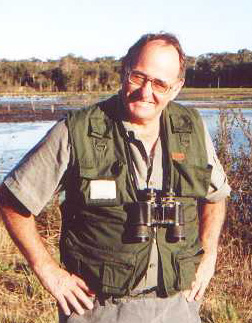 Photo of Pat in September, 2001 - by Teresa Buss-Carden
Photo of Pat in September, 2001 - by Teresa Buss-Carden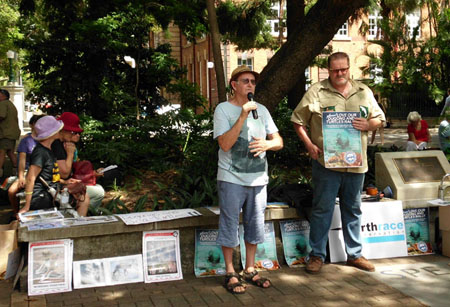
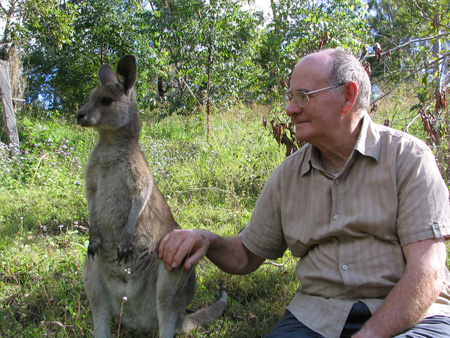
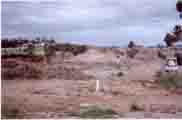


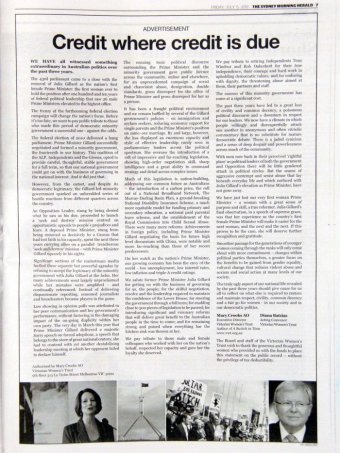

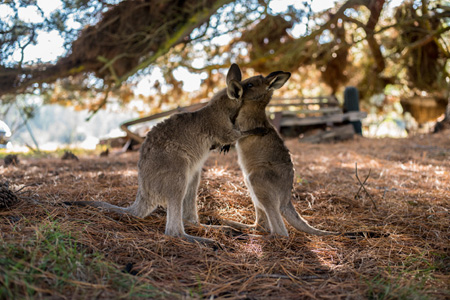 (photo: Braidwood Wildlife Hospital)
(photo: Braidwood Wildlife Hospital)








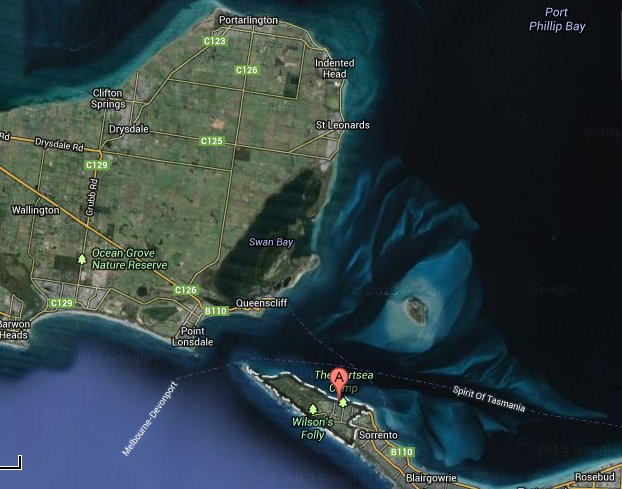
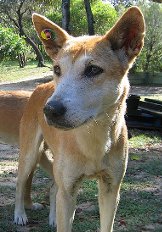
 Saturday 29 June 2013 was the Melbourne launch of the Stable Population Party Australia.
Saturday 29 June 2013 was the Melbourne launch of the Stable Population Party Australia.




 On 7 March 2013, Kevin Rudd was a lead speaker at a pro-population growth meeting held by the "Urban Development Institute of Australia", which is a property developer body that lobbies continually for higher immigration to grow Australia's population. Now Mr Rudd is our Prime Minister, but he still sounds as if he is working for a bunch of property developers.
On 7 March 2013, Kevin Rudd was a lead speaker at a pro-population growth meeting held by the "Urban Development Institute of Australia", which is a property developer body that lobbies continually for higher immigration to grow Australia's population. Now Mr Rudd is our Prime Minister, but he still sounds as if he is working for a bunch of property developers.
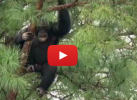 Embedded video inside. Some of the chimps in this film are over 50 years old and this is the first time in decades that they have been able to touch another chimp or feel grass under their feet.
Embedded video inside. Some of the chimps in this film are over 50 years old and this is the first time in decades that they have been able to touch another chimp or feel grass under their feet.

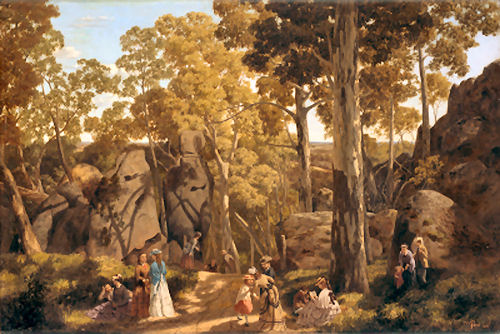
 In recent decades, objection to the high immigration has been smeared by the "politically correct" and phony left political groups as "racist" and loudly denounced. This has helped make it possible for governments to impose record high rates of immigration. As a result, native Australian workers have suffered higher living costs, particularly for housing, and reduced wages as a result of more competition for work. One group that has suffered more than most is nurses and nursing assistants. Already, thanks to 'reforms' by 'Labor' governments beginning in 1983, they were forced to train at their own expense at university or TAFE, where they had previously been provided with on-the-job training and career structure. Their circumstances have since been made even worse by having been discriminated against in favour of ever larger numbers of immigrant workers. The included article by one currently unemployed nurse's assistant (AIN) was first posted
In recent decades, objection to the high immigration has been smeared by the "politically correct" and phony left political groups as "racist" and loudly denounced. This has helped make it possible for governments to impose record high rates of immigration. As a result, native Australian workers have suffered higher living costs, particularly for housing, and reduced wages as a result of more competition for work. One group that has suffered more than most is nurses and nursing assistants. Already, thanks to 'reforms' by 'Labor' governments beginning in 1983, they were forced to train at their own expense at university or TAFE, where they had previously been provided with on-the-job training and career structure. Their circumstances have since been made even worse by having been discriminated against in favour of ever larger numbers of immigrant workers. The included article by one currently unemployed nurse's assistant (AIN) was first posted 
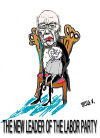 What really drove the so-called leadership crisis in the Federal Government, which has gone on for about three years? Tonight, as Julia Gillard steps down, who really benefits, and how?
What really drove the so-called leadership crisis in the Federal Government, which has gone on for about three years? Tonight, as Julia Gillard steps down, who really benefits, and how?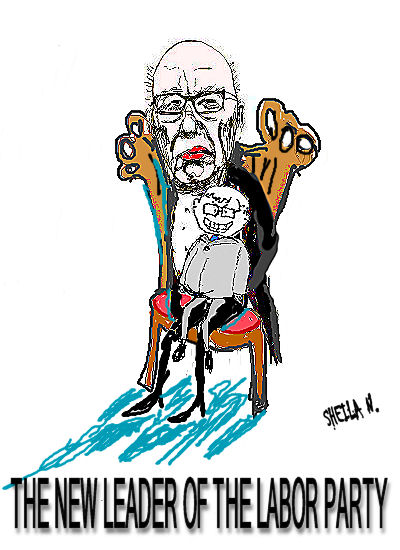
 Bandicoots are another casualty of Eastlink, the tollway that has divided our beautiful Mornington Peninsula in two and wrecked most remaining habitat and corridor linkage for native animals there.
Bandicoots are another casualty of Eastlink, the tollway that has divided our beautiful Mornington Peninsula in two and wrecked most remaining habitat and corridor linkage for native animals there.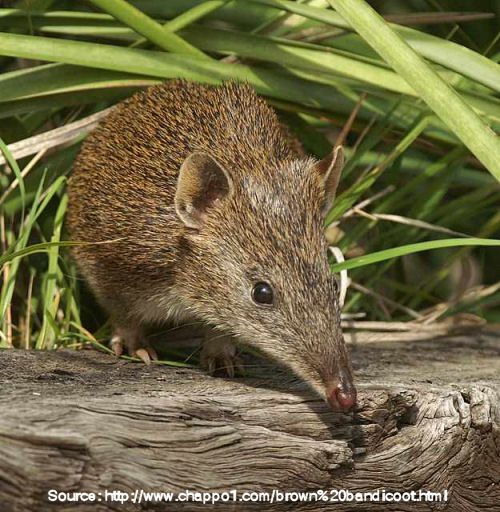 There is a saying that “Man’s morality is judged by the way he treats his animals”. Our native animals in particular are suffering from a biological warfare (exotic predators such as dogs, foxes and cats), a chemical warfare (poisons and fumigants), from shooting of kangaroos and its shocking implications, from putting a bounty, for a while, on eagles and wombats, from severely mistreating dingoes on Fraser island and in the main, not doing by far enough for all the endangered native fauna species.
There is a saying that “Man’s morality is judged by the way he treats his animals”. Our native animals in particular are suffering from a biological warfare (exotic predators such as dogs, foxes and cats), a chemical warfare (poisons and fumigants), from shooting of kangaroos and its shocking implications, from putting a bounty, for a while, on eagles and wombats, from severely mistreating dingoes on Fraser island and in the main, not doing by far enough for all the endangered native fauna species. Speaker - Bob Birrell: "'Why is immigration running at record high levels when unemployment is increasing?"
Speaker - Bob Birrell: "'Why is immigration running at record high levels when unemployment is increasing?"

 There is an Orwellian new Bill on the brink of being passed in Victoria's Parliament. (Debate 27 June) The Bill justifies reducing public rights to consultation and objection by narrowing the scope of consultation, by reducing the scope of information given to the public in respect of revocation of reserves of public land and compulsory acquisition of land, public and private. It allows enormous discretion on the part of the Minister with regard to what information and consultation he allows, even with local government bodies. The really Orwellian part of the Bill is the circular justification of these reductions in citizens' civil rights on so-called grounds of 'efficiency' and 'time saving'. In this case 'cutting red tape' means 'cutting out democracy'.
There is an Orwellian new Bill on the brink of being passed in Victoria's Parliament. (Debate 27 June) The Bill justifies reducing public rights to consultation and objection by narrowing the scope of consultation, by reducing the scope of information given to the public in respect of revocation of reserves of public land and compulsory acquisition of land, public and private. It allows enormous discretion on the part of the Minister with regard to what information and consultation he allows, even with local government bodies. The really Orwellian part of the Bill is the circular justification of these reductions in citizens' civil rights on so-called grounds of 'efficiency' and 'time saving'. In this case 'cutting red tape' means 'cutting out democracy'. This new Major Transport Projects Facilitation Amendment (East West Link and Other Projects) Bill 2013 is to be debated on 27 June in the Legislative Assembly. The Bill, by its very name, shows that it has been drafted to push through a particular hated series of private toll-roads that will horribly scar our green landscape and drastically reduce habitat for native animals. We refer to the East-West Link, which Kelvin Thomson has described as
This new Major Transport Projects Facilitation Amendment (East West Link and Other Projects) Bill 2013 is to be debated on 27 June in the Legislative Assembly. The Bill, by its very name, shows that it has been drafted to push through a particular hated series of private toll-roads that will horribly scar our green landscape and drastically reduce habitat for native animals. We refer to the East-West Link, which Kelvin Thomson has described as 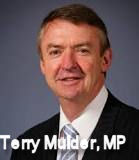 Mr MULDER (Minister for Public Transport) tabled following statement in
Mr MULDER (Minister for Public Transport) tabled following statement in
 Ausfis is one of many private immigration agencies in Australia promoting a problematic political message that sounds like they are representing all Australians and the Australian government and which many Australians would disagree with. Should migration agencies aggressively promote immigration? It's another case of advertising taking over democracy.
Ausfis is one of many private immigration agencies in Australia promoting a problematic political message that sounds like they are representing all Australians and the Australian government and which many Australians would disagree with. Should migration agencies aggressively promote immigration? It's another case of advertising taking over democracy. Ausfis's talk about 'a new land of opportunity' belies the biogeophysical reality of Australia - the oldest, driest continent.
Ausfis's talk about 'a new land of opportunity' belies the biogeophysical reality of Australia - the oldest, driest continent.

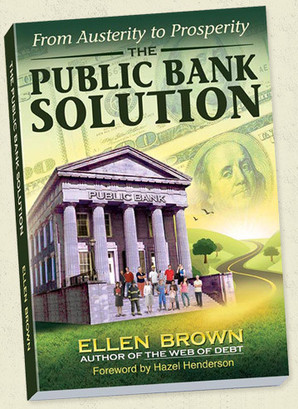
 Hi fellow people that care about Democracy and Political change:
Hi fellow people that care about Democracy and Political change: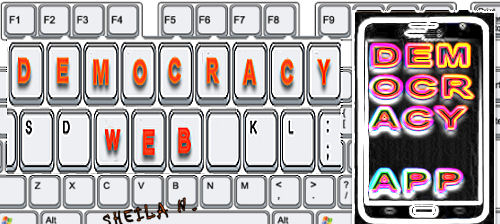 The app would cover:
The app would cover: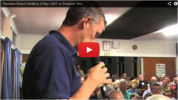 This article contains links to a video of an amazing 2007 meeting at Rainbow Beach where the whole town came out against the development, which has now been terminated by a Court case. Predictably, but sadly, however, the people who lost the Rainbow Beach court case look now as if they are agitating for a political solution in the hope of being able to get what they wanted in another way and put lots of buildings on world heritage Inskip point. So, to keep what has been won, it will be necessary to consolidate that victory.
This article contains links to a video of an amazing 2007 meeting at Rainbow Beach where the whole town came out against the development, which has now been terminated by a Court case. Predictably, but sadly, however, the people who lost the Rainbow Beach court case look now as if they are agitating for a political solution in the hope of being able to get what they wanted in another way and put lots of buildings on world heritage Inskip point. So, to keep what has been won, it will be necessary to consolidate that victory.

 In a country where population growth will make it half the size of China by 2045 and 1 billion by 2100 (if there is any food left),[1] one state - Vermont - is managing to control its population growth, apparently.
In a country where population growth will make it half the size of China by 2045 and 1 billion by 2100 (if there is any food left),[1] one state - Vermont - is managing to control its population growth, apparently. Vermonters who have chosen to limit their family size because of their concern about the impacts of population growth on the environment and quality of life will be celebrating that Vermont’s population did not grow in 2012. They will gather at Oakledge Park in Burlington on June 22 from 10-2 to share their stories and hear speakers. Organizers will also distribute 500 colorfully wrapped and worded “Endangered Species Condoms” because it is over human population that is causing the sixth great extinction. The theme of the celebration is, “A Sustainable Vermont and More Love.”
Vermonters who have chosen to limit their family size because of their concern about the impacts of population growth on the environment and quality of life will be celebrating that Vermont’s population did not grow in 2012. They will gather at Oakledge Park in Burlington on June 22 from 10-2 to share their stories and hear speakers. Organizers will also distribute 500 colorfully wrapped and worded “Endangered Species Condoms” because it is over human population that is causing the sixth great extinction. The theme of the celebration is, “A Sustainable Vermont and More Love.”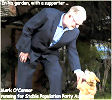 Mark O'Connor is running for the federal Australian Senate as a candidate of the Stable Population Party Australia (SPPA).
Mark O'Connor is running for the federal Australian Senate as a candidate of the Stable Population Party Australia (SPPA).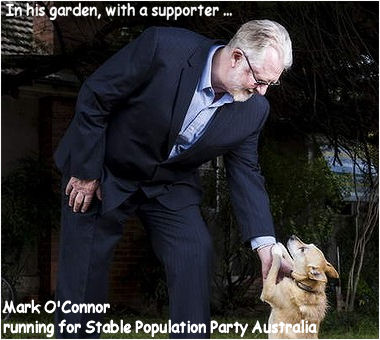 Photo source was
Photo source was
Recent comments